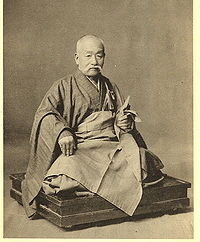Views
Gonda Raifu 權田雷斧 (1846-1934)
|
|
| Notable Associates: |
|
Gonda Raifu 權田雷斧 (1846-1934) was a Japanese Shingon 真言 master and the teacher of several Chinese Buddhists in the 1920s.
Contents |
Biography
Gonda was the son of a local official, and he took ordination under Kōin 法印 at the age of seven. At age 11 he went to train at Buzan 豐山 (the head temple for the Shingin Sect 新義派 of Japanese Shingon 真言 Buddhism). There he studied Consciousness-Only 唯識 and Buddhist logic 因明.
At age 26, he converted to the Sōtō School 曹洞宗 of Zen, changing his name 名 to Raifu 雷斧. He began studying Dōgen's 道元 Shōbōgenzō 正法眼藏 and eventually accepted a position at the School for Sōtō Studies 曹洞宗專門學校. At 32 he returned to Buzan, then received dharma transmission from 榮嚴, and took abiṣeka 灌頂, or esoteric initiation, under a number of different masters. From age 33 to age 56, he taught at a number of Shingon schools. At age 56, Gonda became the head of the Buzan Sect and set up a college in Tōkyō. When he was 63, he established Buzan University 豐山大學.
In May 1924, at the age of 79, Gonda accepted the invitation of Wáng Hóngyuàn 王弘願 (who had translated some of his writings on Esoteric Buddhism into Chinese) to come to Kāiyuán Temple 開元寺 in Cháozhōu 潮州 to give esoteric initiation. The following year, Gonda asked Wáng (who was accompanied by Mànshūjiēdì 曼殊揭諦) to come to Japan to complete his training.
In 1928, Gonda became principle of Taishō University 大正大學, from which he retired in March, 1930. He passed away in 1934.
Important Works
- Mikkyō kōyō 密教綱要
- This was work was translated into Chinese as Mìzōng gāngyào 密宗綱要 by Wáng Hóngyuàn
Notable Chinese Students
Notes
References
- Yú Língbō 于凌波, ed. Xiàndài Fójiào rénwù cídiǎn 現代佛教人物辭典 (A Dictionary of Modern Buddhist Persons), 2 vols. Taipei: Foguang, 2004. Pp. 2.1789a-1790b.
